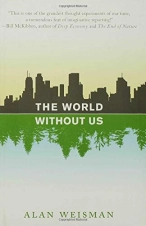The World Without Us
A book review.

The World Without Us
by Alan Weisman
published: 2007.07
ISBN: 0312347294
genre: Science
reviewed:2008.04.05
👍🏼 recommended
This is a fascinating book that explores a simple concept: what would happen if humans vanished frmo the world?
The author looks at the question from the point of view of the impact to the planet itself. The forests, cities and seas. He looks at the fauna and flora that inhabit the world, and how they'd fare with us out of the way.
It's an impressive read, both in its scope and in the clarity with which the writer conveys the concepts. Trekking from the last remnants of the European boreal forest (in Belarus) to rose gardens in Kenya to the subway system of New York and the oil industry's vast infrastructure in Houston, this book leaves little unexplored. The author takes us to abandoned resorts (Cyprus) and ancient underground dwellings (Turkey), from remote South Pacific atolls to sprawling North Pacific garbage dumps.
Along the way, the author lets the reader draw their own conclusions, and keeps the tone one of detached observation. This helps the author make his point and helps the reader understand the impact that we have on this planet.
This is a fascinating read, and one that I recommend wholeheartedly.
One thing that wasn't covered to any real extent is the question of what would happen to the atmosphere. This is difficult stuff upon which to speculate, but I imagine that it wouldn't be impossible to make some educated gueses.
For one thing, we know what happened when the planes were grounded following the 2001/09/11 attacks: air temperatures all over the continent went up. It was thought that this was due to the cessation of delivery of hydrocarbons to the high elevations where airlines typically release them.
Another interesting concept is the effect of forests. It's been suggested that when the great plagues of the middle ages caused a net reduction in the population of Europe, the forests came back with the result that the climate grew steadily colder. The trees were absorbing more of the sun's energy and allowing less heating of the ground (and through that, the air).
Maybe there will be a sequel.